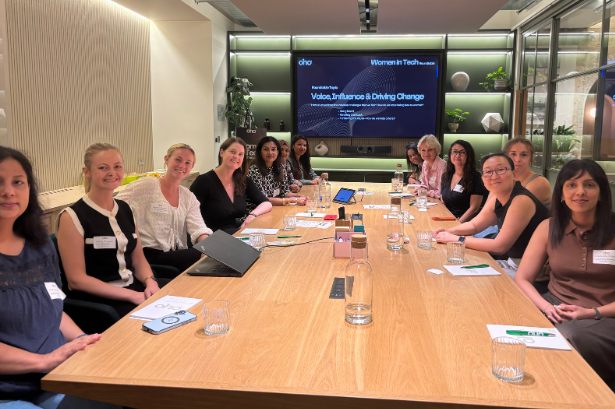This month, we hosted our very first London-based Women in Tech Roundtable.. The event brought together female engineering managers for an evening of honest discussion and knowledge sharing on the topic of Technical Leadership for Women.
The roundtable was hosted by Holly and Aisling, with special thanks to our speaker Heather Payne (CTO and Founder of Toast91), who sparked such insightful and thought-provoking conversations throughout the evening.
Here are the five key takeaways from the discussion:
1. Driving Change and Self-Advocacy
One of the most important qualities of a technical leader is the ability to speak up and stand by your ideas. Discrimination, whether subtle or overt, should not be ignored or downplayed. Participants emphasised the importance of:
-
Reclaiming credit for your contributions if they are overlooked or repeated by others.
-
Self-advocacy is about speaking up, being loud and having the confidence to back yourself or stand up against things that aren’t right, even if it may feel uncomfortable at times.
-
Building credibility within your organisation so your voice carries weight when tough decisions are made.
-
Using platforms such as social media to share experiences and amplify your voice beyond the organisation.
-
Knowing your rights and seeking advice from legal experts where necessary, as HR is often aligned with business interests.
Self-advocacy ultimately strengthens leadership presence and influence.
2. Mentorship, Allies and Networks
No leader grows in isolation. Having the right support systems in place makes all the difference in navigating career challenges. Key reflections included:
-
Mentors provide invaluable guidance. External mentors can give perspective on whether challenges are organisational or personal, while internal mentors can help you navigate culture and processes.
-
Allies in senior positions can amplify your voice, ensure your contributions are recognised, and open up opportunities you may not otherwise have access to.
-
Networks of peers and colleagues provide reassurance, shared learning, and a sounding board for ideas.
Participants agreed that building and maintaining these relationships requires intentional effort, but the return is career-defining.
3. Career Progression and Visibility
Progression comes from being proactive. Leaders need to be intentional in how they shape their growth and make their contributions visible. The group highlighted several strategies:
-
Setting clear objectives each quarter, whether around skills, projects, or career milestones.
-
Making your work visible across teams and levels of the organisation so the impact is clear at every layer.
-
Going into every meeting with a clear purpose and following up to show progress over time.
-
Be the person to ask probing questions about promotions, new projects or roles coming up and get actionable targets. i.e. what would it take for me to get there?
The Value of Skip-Level Meetings
Skip-level meetings were discussed as one of the most effective tools for career progression. These meetings provide opportunities to:
-
Gain visibility with senior leaders beyond your direct manager.
-
Understand the broader business context and upcoming opportunities.
-
Demonstrate initiative by asking probing questions about future projects or skills that will be in demand.
-
Build relationships and trust with decision-makers higher up the organisation.
Leaders agreed that approaching skip-levels with prepared questions and clear objectives can help open doors and ensure your contributions are seen where they matter most.
4. Executive and Boardroom Influence
For women in technical leadership, influencing at the executive and board level requires both preparation and adaptability. Advice included:
-
Know your audience. Tailor your communication to what matters most for each stakeholder, whether it is finance, operations, or strategy.
-
Prepare in advance. Share presentations and proposals beforehand, and invite questions early to avoid surprises.
-
Build credibility through honesty. Do not overpromise on timelines or outcomes. Transparency builds long-term trust.
-
Understand financial cycles. Knowing when budgets are set or reviewed helps ensure requests are made at the right time.
-
Focus on impact. Always frame your input around the problem you are solving, why it matters, and the measurable outcomes.
Negotiating at Senior Levels
Negotiation skills are crucial at the executive level. Leaders emphasised the need to:
-
Balance time versus functionality by understanding what absolutely must be delivered and by when.
-
Clearly explain why a piece of work needs to be completed by a certain date and the trade-offs involved.
-
Find a compromise without sacrificing credibility, being upfront about what can realistically be achieved.
-
Always return to the central question: what problem are we solving, and why does it matter to the business?
-
Protect your reputation by never overstating or misleading. Honesty strengthens credibility in the long run.
This approach not only builds executive presence but also positions women leaders as trusted voices in the boardroom.
5. Leading Through Change
Change is inevitable in any technical role, and strong leaders know how to guide their teams through it with clarity and confidence. Our discussion highlighted the importance of:
-
Using data over emotion to make your case and defend decisions.
-
Providing transparency to your team so they feel supported and understand the direction of change.
-
Identifying the right decision-makers, asking them probing questions, and ensuring alignment across levels.
-
Doing the research to challenge constructively and educate others, helping to bring people on the journey.
-
Documenting contributions and giving credit fairly so teams feel valued and motivated.
By combining transparency with data-driven decision-making, leaders can inspire confidence and maintain trust during periods of uncertainty.
Final Thoughts
Have confidence. Believe in yourself and back your ability, even in spaces where that can feel challenging.
Lift others up. Sometimes that means doing something that may not directly benefit you, but makes a huge difference for another woman: mentoring, offering advice or guidance, or speaking up when someone’s voice isn't being heard. Small acts like these create ripples that can shift culture over time.
As Heather put it, it’s about furthering the cause. Ask ourselves how we can support others, so the path becomes easier and more open for the women who follow.
Our first London-based Women in Tech Roundtable was a brilliant evening of open conversation, practical advice, and inspiring leadership. A huge thank you to everyone who joined, and to our hosts for bringing the group together.
We are looking forward to hosting more events soon and continuing the conversation on how women can lead and thrive in technical leadership roles.
If you're interested in joining, please register your interest here: https://ow.ly/z5Et50TqI3G




